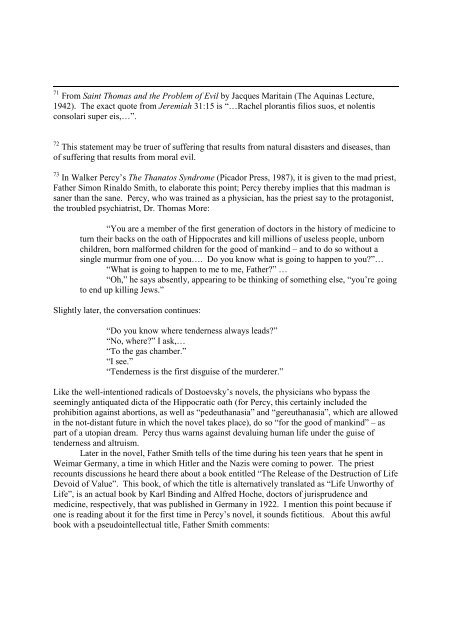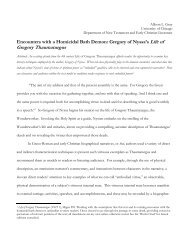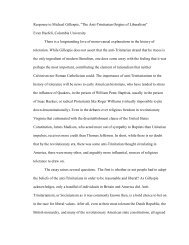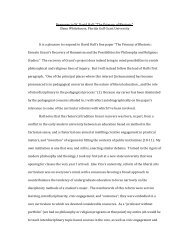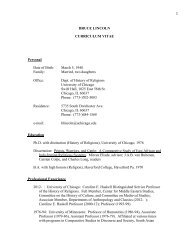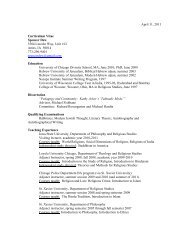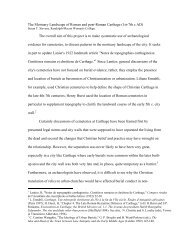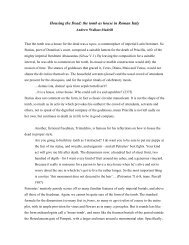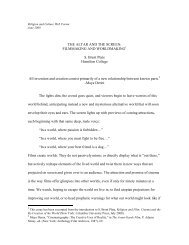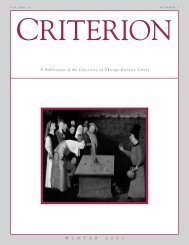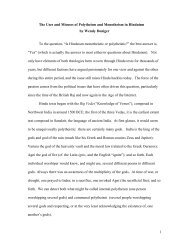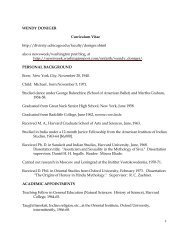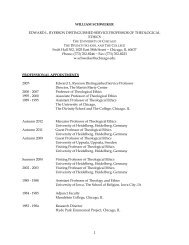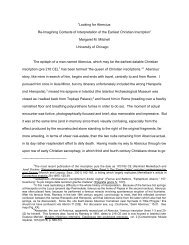The Reification of Evil and The Failure of Theodicy: The Devil in ...
The Reification of Evil and The Failure of Theodicy: The Devil in ...
The Reification of Evil and The Failure of Theodicy: The Devil in ...
Create successful ePaper yourself
Turn your PDF publications into a flip-book with our unique Google optimized e-Paper software.
71 From Sa<strong>in</strong>t Thomas <strong>and</strong> the Problem <strong>of</strong> <strong>Evil</strong> by Jacques Marita<strong>in</strong> (<strong>The</strong> Aqu<strong>in</strong>as Lecture,<br />
1942). <strong>The</strong> exact quote from Jeremiah 31:15 is “…Rachel plorantis filios suos, et nolentis<br />
consolari super eis,…”.<br />
72 This statement may be truer <strong>of</strong> suffer<strong>in</strong>g that results from natural disasters <strong>and</strong> diseases, than<br />
<strong>of</strong> suffer<strong>in</strong>g that results from moral evil.<br />
73 In Walker Percy’s <strong>The</strong> Thanatos Syndrome (Picador Press, 1987), it is given to the mad priest,<br />
Father Simon R<strong>in</strong>aldo Smith, to elaborate this po<strong>in</strong>t; Percy thereby implies that this madman is<br />
saner than the sane. Percy, who was tra<strong>in</strong>ed as a physician, has the priest say to the protagonist,<br />
the troubled psychiatrist, Dr. Thomas More:<br />
“You are a member <strong>of</strong> the first generation <strong>of</strong> doctors <strong>in</strong> the history <strong>of</strong> medic<strong>in</strong>e to<br />
turn their backs on the oath <strong>of</strong> Hippocrates <strong>and</strong> kill millions <strong>of</strong> useless people, unborn<br />
children, born malformed children for the good <strong>of</strong> mank<strong>in</strong>d – <strong>and</strong> to do so without a<br />
s<strong>in</strong>gle murmur from one <strong>of</strong> you…. Do you know what is go<strong>in</strong>g to happen to you?”…<br />
“What is go<strong>in</strong>g to happen to me to me, Father?” …<br />
“Oh,” he says absently, appear<strong>in</strong>g to be th<strong>in</strong>k<strong>in</strong>g <strong>of</strong> someth<strong>in</strong>g else, “you’re go<strong>in</strong>g<br />
to end up kill<strong>in</strong>g Jews.”<br />
Slightly later, the conversation cont<strong>in</strong>ues:<br />
“Do you know where tenderness always leads?”<br />
“No, where?” I ask,…<br />
“To the gas chamber.”<br />
“I see.”<br />
“Tenderness is the first disguise <strong>of</strong> the murderer.”<br />
Like the well-<strong>in</strong>tentioned radicals <strong>of</strong> Dostoevsky’s novels, the physicians who bypass the<br />
seem<strong>in</strong>gly antiquated dicta <strong>of</strong> the Hippocratic oath (for Percy, this certa<strong>in</strong>ly <strong>in</strong>cluded the<br />
prohibition aga<strong>in</strong>st abortions, as well as “pedeuthanasia” <strong>and</strong> “gereuthanasia”, which are allowed<br />
<strong>in</strong> the not-distant future <strong>in</strong> which the novel takes place), do so “for the good <strong>of</strong> mank<strong>in</strong>d” – as<br />
part <strong>of</strong> a utopian dream. Percy thus warns aga<strong>in</strong>st devalu<strong>in</strong>g human life under the guise <strong>of</strong><br />
tenderness <strong>and</strong> altruism.<br />
Later <strong>in</strong> the novel, Father Smith tells <strong>of</strong> the time dur<strong>in</strong>g his teen years that he spent <strong>in</strong><br />
Weimar Germany, a time <strong>in</strong> which Hitler <strong>and</strong> the Nazis were com<strong>in</strong>g to power. <strong>The</strong> priest<br />
recounts discussions he heard there about a book entitled “<strong>The</strong> Release <strong>of</strong> the Destruction <strong>of</strong> Life<br />
Devoid <strong>of</strong> Value”. This book, <strong>of</strong> which the title is alternatively translated as “Life Unworthy <strong>of</strong><br />
Life”, is an actual book by Karl B<strong>in</strong>d<strong>in</strong>g <strong>and</strong> Alfred Hoche, doctors <strong>of</strong> jurisprudence <strong>and</strong><br />
medic<strong>in</strong>e, respectively, that was published <strong>in</strong> Germany <strong>in</strong> 1922. I mention this po<strong>in</strong>t because if<br />
one is read<strong>in</strong>g about it for the first time <strong>in</strong> Percy’s novel, it sounds fictitious. About this awful<br />
book with a pseudo<strong>in</strong>tellectual title, Father Smith comments:


